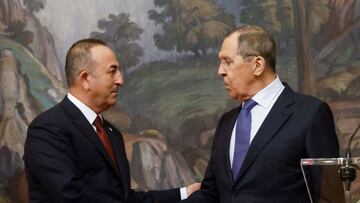Russia-Ukraine conflict: is a ceasefire possible soon with the negotiations?
As Russia's invasion of Ukraine rages on, millions have fled the country, and many are hoping that a diplomatic solution can still be reached.


Since the Russian invasion of Ukraine began a little over three weeks ago, diplomats from both countries have been negotiating behind the scenes. These negotiations, thus far, have not been fruitful.
Accusations of bad faith and false promises have been lodged by both sides, but it is Russia that holds the power to stop the attacks on civilians, infrastructure, and Ukrainian forces.
The Ukrainian government seems to be considering conceding some of the demands made by the Kremlin, as they do not have the security guarantees to prolong the war. However, even when the sides agree there are countless decisions that go into the details.
This week, Volodymyr Zelensky has stated publicly that he has cooled on the admissions of Ukraine to NATO if it could open a door to peace. However, the Russian demand goes beyond NATO membership for its western neighbor. The main sticking point for Vladimir Putin is the neutrality of Ukraine.
During his daily address early in the morning on Saturday 19 March, President Zelensky affirmed that "negotiations on peace, on security for us, for Ukraine - meaningful, fair and without delay - are the only chance for Russia to reduce the damage from its own mistakes."
Speaking directly to those in Moscow, Zelensky said "It's time to meet. Time to talk. It is time to restore territorial integrity and justice for Ukraine. Otherwise, Russia's losses will be so huge that several generations will not be enough to rebound."
🇺🇦This evening's message to #Ukraine from @ZelenskyyUa
— Christopher Burgess (@burgessct) March 19, 2022
"Meaningful peace & security talks for Ukraine are the only chance for Russia to reduce the damage from its own mistakes. It's time to meet. Time to talk. It is time to restore territorial integrity & justice for Ukraine." pic.twitter.com/cXzqdrB28z
In an interview, Russian Foreign Minister Sergey Lavrov’s referred back to the history of the collapse and agreements that were made between former Soviet Republics and Russia which stipulated "that Ukraine would be a non-aligned and militarily neutral state." In recent years as Ukraine has showed increasing interest in joining NATO and aligning itself closer with the European Union are seen as a threat to Russian security.
Regardless of if the threat is real or perceived, the Kremlin is responsible heinous acts of violence targeting civilians that will not soon be forgotten. This does not mean, however, that the US and the EU should not be doing everything within their power to bring the conflict to an end diplomatically. If they are not direct participants in the conflict, then they have the full suite of diplomatic tools available to work towards peace. Creating silos and natural echo chambers will only elevate the most reactionary and extreme voices.
Spoke with @SecBlinken on efforts to bring an end to Russia’s brutal war of aggression against Ukraine and multiple war crimes. To this end, it is crucial to further strengthen Ukraine’s defense capabilities, apply more pressure on Russia, and use all available diplomatic tools.
— Dmytro Kuleba (@DmytroKuleba) March 18, 2022
Global powers that are truly interested in protecting the future of Ukraine, must allow its people to decide its directions. If concessions on neutrality must be made, countries who have promoted the cause of the Ukrainian people should ensure that they are able to decide it. The people of Ukraine, like those around the world, should not be pawns in a proxy war between two nuclear powers living in the last century. New leadership, new citizens, new perspectives, a changing world, demand the respect and flexibility of a global order that strives towards peace. The challenges the world faces when it comes to climate change, hunger, global inequalities, and wide health disparities, will not be solved by replaying the horrors of the twentieth century.
Could a deal be announced soon?
Lavrov mentioned on 17 March that the two parties are working on "specific language" relating to the neutral status of Ukraine, that he believes is "close to being agreed upon." President Zelensky has also shown greater optimism in the ability of both sides to reach an agreement to a ceasefire or permanent end of the conflict.
Related stories
President Putin has drawn the line at NATO expansion but has agreed that Ukraine is entitled to "security guarantees." It seems that the negotiations are stalling over the ability of diplomats to decide what these "guarantees" might be and whether the Kremlin will agree to stop the invasion over the terms.
Ukraine, almost since its founding, has been pulled in different directions by the West and Russia. It is now becoming clear that neither side was interested in neutrality. Now, as the Ukrainian people struggle for their future, their leaders understand that these security guarantees and protections will be critical to that objective.

